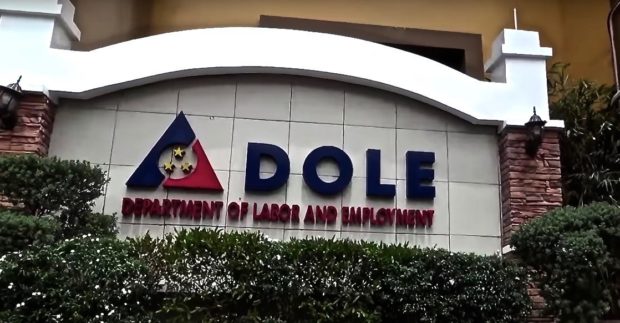
DOLE main office.
MANILA, Philippines — The Department of Labor and Employment (DOLE) said on Monday that it will soon meet with delegates from the United Arab Emirates (UAE) for a joint meeting to settle the agreement on the standard employment contract for the overseas Filipino workers (OFWs).
In an online press briefing, DOLE International Labor Affairs Bureau (ILAB) director Alice Visperas said that there will be a joint committee meeting on March 1 and 2, between high-level delegates from the UAE and some senior officials from DOLE.
Visperas said that the third joint meeting will focus on some unresolved provisions in the standard employment contract under the memorandum of agreement signed between the two countries.
The agreement also covers the deployment of OFWs in the UAE — which is on hold or suspended for more than three years now.
“Meron po tayong existing bilateral agreement with them pero hindi pa po ito nae-enforce kasi hindi pa po ito kumpleto. ‘Yung attachment sa standard employment contract ay hindi pa nafa-finalize,” she said.
(We already have an existing bilateral agreement with the UAE but it is not yet enforced because it is still incomplete. The attachment in the standard employment contract is not yet finalized.)
“Dahil po dito, suspended po ang deployment ng ating mga workers sa UAE. Hindi pa po nagre-resume simula po ng to at masuspend mga three to four years ago,” she added.
(Because of this, the deployment of our workers in UAE is still suspended. It has not been resumed since it was canceled around three to four years ago.)
SEC provisions
- According to Visperas, the following are some of the important provisions included in the standard employment contract which will be discussed between the two parties next month:
- The provision protecting the rights of OFWs against attempts by their employers to withhold their documents – such as their passports.
- The specific working hours of the OFWs.
- The provision regarding day-offs and where the OFWs would spend it.
“Some of the employers [sa UAE], unfortunately, hindi nila naipapatupad itong ganitong condition for the workers,” said Visperas.
(Some of the employers, unfortunately, are not complying with these kinds of conditions for their workers.)
She added that other contentions will also be raised during the joint meeting. One of those issues is the limited signatories for the OFW’s working contracts.
“Sa contract sa UAE, dalawa lang ang signatory, ‘yung employer at ‘yung worker. Pero tayo dito, under our laws, dapat merong four signatories. ‘Yung employer, worker, Philippine recruitment agency, at foreign recruitment agency,” the DOLE official explained.
(There are only two signatories for the working contract in UAE, the employer and the worker. But here in the Philippines, under our laws, we have four signatories: the employer, worker, Philippine recruitment agency, and foreign recruitment agency.)
“Kailangan may joint and solidarity liability para kung saka-sakaling may mangyari sa ating worker, meron tayong hahabulin na mananagot sa kapakanan nila,” she continued.
(There should be a joint and solidarity liability so that if our workers will be in an unfortunate situation, we have someone we could chase to take responsibility for the worker’s welfare.)
These provisions, according to the labor department, aims to protect the rights and safety of our workers in the UAE.
Once the two countries have agreed on the said points, Visperas said that the deployment of OFWs in the said country might soon be continued.
“Gusto po kasi ng UAE side na mag resume na ulit yung deployment ng ating mga workers,” said Visperas.
(The UAE side would like to resume the deployment of our workers.)
Different deployment methods
Amid the ongoing suspension in the deployment of OFWs in the UAE, there were still few workers who flew out through different yet potentially unsafe deployment methods, according to Visperas.
“Nakakalungkot pero sila ay dumadaan sa ibang pamamaraan. Napupunta po sila doon under visit visa and then pagdating doon, ‘yung iba ginagawa nila e-exit muna sila sa ibang neighboring countries para makakuha ulit ng entry,” she detailed.
(It is sad to say but they are undergoing different procedures to enter the UAE. They will go there under a visit visa and then once they arrive, some of them will exit first in neighboring countries and will go back for another entry.)
“Puro ganon ang ginagawa nila every three months,” she added.
(They do it every three months.)
Visperas added that it is also possible for the government of UAE to convert some visitor’s visa into a working visa.
These procedures or methods make it harder for the labor department to protect the workers’ welfare and safety since their deployment was not processed by official channels such as the Philippine Overseas Employment Administration (POEA).
Based on DOLE’s data, currently, there are over 600,000 OFWs in the UAE. Of the sum, more than 400,000 are deployed in Dubai while some 200,000 are designated in Abu Dhabi.